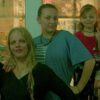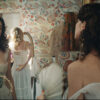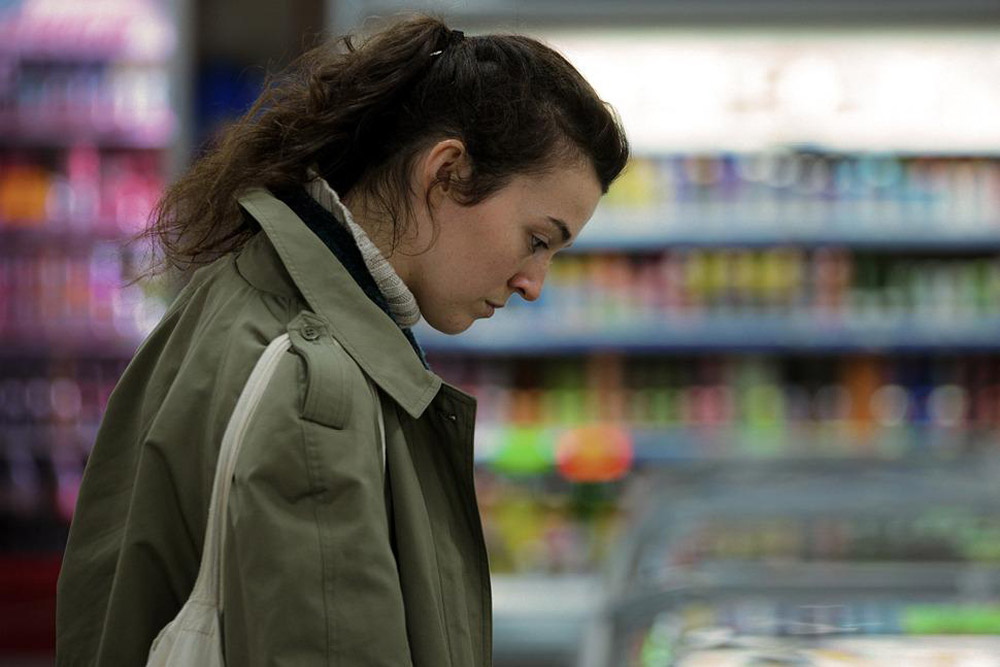If Laura Carreira ever needed to know she was onto something with “The Shift,” all the confirmation she needed came when she started to look for her central location of a supermarket and found few that were willing to open the doors to her camera.
“It’s even more frustrating when there are so many of them out there,” Carriera said recently via e-mail on the eve of her short film’s debut at the Venice Film Festival. “Anytime I would go shopping I would agonize over the location search. The producers would tell you!”
Eventually, the filmmakers found their spot and Carreira makes the most of it with the immersive nine-minute peek into the life of Anna (Anna Russell-Martin), cleverly revealed through trawling through the aisles of a grocery store. Just as the filmmaker saw plenty of stores and ultimately found that not many that were accessible to her, Anna is surrounded with products she cannot buy in her precarious state, waiting for a call from her employer to find out whether she’s have enough work this week to cover costs. Sorting through shelves looking for the cheapest necessities, realizing cheese is a luxury she just can’t have at this time, Anna’s anxieties are expressed through the way Carreira brings the cacophony of other shoppers, the rustle of carts and the piercing pings of registers into the mix and her dreams conveyed with the items she can touch, but never own, all the while having simple things like buying a can of dog food for her pet become an obstacle when it’s only available in bulk.
“The Shift” culminates in a breathtaking emotional climax where Anna learns her fate waiting for checkout, and while it may only be one livelihood that’s on the line specifically, Carriera makes it feel as if it’s the whole world is hanging in the balance when her lead is seen inside a bountiful place in which she is made to feel she has little to offer and can’t afford to advantage of what’s right in front of her. It’s the Portuguese filmmaker’s second film to find a deeply human way to relate the larger struggle of a society that dealing with ever-increasing wealth inequity and the lack of a proper safety net inside just one person’s story and with “The Shift” soon taking a global stage in Venice, Carriera was kind enough to answer a few questions by e-mail about her most ambitious work to date, the inspiration behind the story and finding cinematic opportunities where you’d least expect it.
How did “The Shift” come about?
My main interest was to continue to explore our dependency on work in line with my previous short but this time from the perspective of a younger character. Another element is the image of the dog being abandoned. I witnessed this twice, once in my childhood and then more recently in the UK and they were images that stayed with me. When I was about to start writing the film there was also a CCTV video that went viral showing a man abandoning a dog and the abuse directed at this man online was so aggressive – that is strange to me given no one really knew anything about him.
Did the idea of a supermarket for a setting this phone call come immediately?
It was there from the very beginning, yes. Perhaps because I knew what our funding limitations would be to make this film but also because it felt like an interesting challenge to set the whole film during a day-to-day activity like a trip to the supermarket. I always have an urge to write stories in settings that are limited and don’t feel cinematic.
The sound design plays such an integral part in this, did you have ideas about it in mind from the start? If so, did it evolve after you saw Anna’s performance when it reflects her psyche?
Some ideas were there from the start, like the sound of the people around Anna during the phone call. Even in the script, their voices were already present as a way to frame her experience, not in isolation, but in amongst people. But a lot of the other sounds were discovered with the brilliant sound designer John Cobban – he really thought of the sound step-by-step to match the character’s journey and it definitely pushed the film further.
What convinced you that you had the right lead actress for the part? I understand Anna Russell-Martin sent in a tape of her performing the phone call?
Anna caught my attention straight from the beginning with her first tape. I could immediately see her playing the part. She is a brilliant actress and already in the casting process she was asking questions and taking on directions – I felt she was going to be a pleasure to work with.
Is there anything that happens either in her performance or just as a result of shooting conditions that was unexpected that’s now in the film and you like about it?
Nothing that I can think of. This was the first time for me working with a large crew, with producers, executives, funding and so on and that meant I had to really prepare myself during the writing of the script so that I was absolutely sure what I was shooting. I was confident in what I had written and in that sense the film is very similar to what’s on paper. Even the editing was a fairly straightforward process as we didn’t have a lot of options from the rushes.
In your director’s bio, it’s said that your films “call for a renewed interest in bringing marginalized characters to the screen, with a special focus on exploring the representation of work in cinema” – I wondered was that actually what inspired you to get into filmmaking?
I don’t know if that awareness was there from the start but now it’s what inspires me to continue to make films. During film school, I became slightly obsessed with the way work was portrayed in cinema because so many films avoid working characters unless it’s a “cool” profession like a lawyer, a doctor etc. So I started to have an interest in filming people’s routines and their work. Because of that, I ended up making mainly documentaries during that period, but I eventually found it incredibly limiting and controlling. It was very hard to gain access to workplaces. There were too many questions asked, so I began to look for a different way to bring these lives to the screen. Fiction gave me the freedom to do that.
What’s it like to get to the finish line with “The Shift” and premiere in Venice?
It’s an incredible honor to attend a festival where some of my favorite filmmakers have presented their films. Especially for short films, there is no greater reward than to get to see your film on the big screen. I’ve not had the chance to see “The Shift” in that way yet, so for me and the team, it will be special to see it for the first time in Venice.
“The Shift” will premiere at the Venice Film Festival on September 10th at 7 pm and 10 pm at the Sala Giardino.




